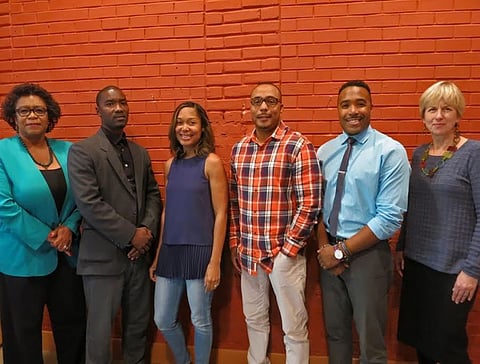Community Groups Unite In the CD For Redevelopment of Liberty Bank Building
by Clifford Cawthon
Gentrification is real. In the Central District, the magnitude of that reality is painfully clear. A Community partnership in the Central District was formed two weeks ago in response to this reality by redeveloping the Liberty Bank Building. A Memorandum of Understanding (MOU) was signed as a commitment to redevelop Liberty Bank as an alternative to expensive apartments being built in the area, as well as an affordable incubator for Black businesses.
This story begins with the grandson of one of the founders of the Liberty Bank, Wyking Garrett. I sat down with Mr. Garrett at the Black Dot, a co-operative work-space and business incubator for Black and P.O.C start-ups at 23rd and Union.
"The Liberty Bank project represents a new day for development, in our community and potentially other communities facing [displacement]…..those communities can come forward and [take part] in the future of the city of Seattle," a city that is becoming increasingly inaccessible to many low-income renters and households of color.
Mr. Garrett also referenced the reality of how critical this project is to keep Seattle from becoming a "one-class city." When I asked him what he meant by 'one class city', he spoke to something that more and more Seattleites are seeing with "Seattle [being] on the trajectory to become "a mainly White, middle class city."
The Memorandum of Understanding signed by Africatown Center (an organization that Wyking is also affiliated with), Capitol Hill Housing, Black Community Impact Alliance, and Centerstone, is intended to carry on that legacy of empowering the Black community and other affected communities of color.
The building will have affordable units and commercial space designed to address the displacement of communities that are most affected by inequality as from Mr. Garrett's perspective, this displacement has been "based on a lack of affordable spaces to live or have businesses."
The redevelopment project's other leading sponsor; Capitol Hill Housing (CHH) is also investing in it with the hope of the redevelopment providing an alternative development model for development for the city. Ashwin Warrior, the Communications Director, met with me to express CHH's vision for the project. "The liberty bank represented a community response to systematic and institutional racism" according to Ashwin, and CHH says that this history of the building will be reflected in that new development, as well as the community's current priorities.
Originally, the site was going to be preserved as a historical monument; however, the city ultimately did not award it such status. The new building will include 115 new units of affordable housing and the coalition for the redevelopment project is examining solutions on how to make these affordable units available and present for displaced communities to access. According to Mr. Warrior, the partnership, in part, is designed to help the project do 'affirmative marketing', intentionally marketing the apartment complex in ways that make available units accessible to anyone. Specifically, the coalition hopes tp and catch the eye of residents who have been forced to move out of Seattle due to the competitive housing market.
The Liberty Bank's requirements will be standard once the building is complete and they are also following Capitol Hill Housing's practice of 'individual assessment', Mr. Warrior described the process as a way to open opportunities to people who face large obstacles in the housing market, especially those who have criminal backgrounds: "rather than reject folks with a criminal history outright, we employ a process by which we take into account efforts at rehabilitation after any criminal offense and individually assess folks through a blind panel process to determine if they are eligible". In addition to cases of criminal history, they also extend the process to many aspects of qualifying for housing that people find challenging- credit, past evictions, etc…
The art for this project is being curated by Al Doggett Studios, which according to the redevelopment's website www.libertybankbuilding.org , is taking the lead on bringing the project to life for both visitors and its eventual residents.
The coalition wants diverse building contractors to work on this project as well. On November 15th, the Walsh Construction, our General Contractor, will be hosting a meeting at Centerstone's offices (722 18th Ave Seattle, WA 98122) from 6-8 pm. This will be a public event geared toward opportunities for minority-owned subcontractors to work on the construction of the building. In a statement sent to the Emerald, there is $12 million dollars in construction work that could go to minority-owned subcontractors, and the coalition is working to outreach to the community. Anything outside of Mechanical, Electrical and Plumbing work would be eligible to receive a bid.
An article from the Seattle Times earlier this year revealed the Central District's Black population has shrunk to less than a fifth. Both partners in this project as well as concerned community members hope that this helps to reverse the trend, a trend that many are seeing nationally and according to Mr. Garrett, the partnership is ready to address it as. "We have major companies working on building sustainable communities on Mars, that's a hard problem. We can certainly address how to create sustainable communities here in the city…another world is possible," he says.
Help keep BIPOC-led, community-powered journalism free — become a Rainmaker today.


